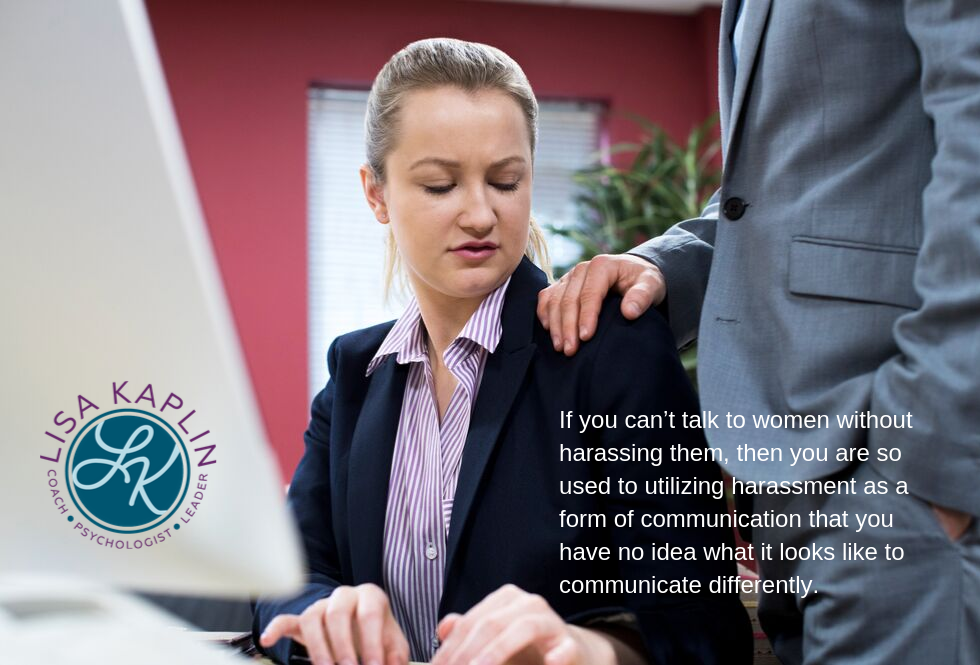As part of the work I do, I lead anti-sexual harassment seminars for a variety of companies around the country. From July 1st until the end of October, I will do about thirty of these seminars. People often ask me about the most common situations that arise in the anti-harassment seminars. Without question, the most common comment I receive from a variety of men is this, “I’m just going to stop talking to women completely. It’s just too hard.” Essentially, these men are saying that it’s just too hard to not sexually harass women.
Admittedly every time I hear this, I roll my eyes, take a deep sigh and say something snarky along these lines, “Seriously guys? Seriously? I’m 57-years-old and I’ve never sexually harassed anyone. Never. And here’s the funny thing…it wasn’t hard at all for me to not harass anyone. It was actually super easy.” I get mixed reviews on my comment, but many of the men still say that it’s just too hard not to offend anyone or have their comments misinterpreted. This is one big bold lie. It isn’t hard at all. Lots of people live their whole lives without sexually harassing others.
If you truly believe you can’t talk to women without harassing them, then you’ve either never talked to women or you are so used to utilizing harassment as a form of communication that you have no idea what it looks like to communicate differently. This, of course, would also mean that you’ve either never been called out on it or you’ve ignored the call out and have probably said something along the lines of, “Don’t be so sensitive.”
If you can’t talk to women without harassing them, then you are so used to utilizing harassment as a form of communication that you have no idea what it looks like to communicate differently. #sexualharassment #work #relationships Click To TweetMen, you can do better. Lots of men are doing far better. So if some of you can do it, all of you can do it. It’s not hard to be kind, to be appropriate, and to not sexually harass others. And before you say, “Women sexually harass too,” you are correct. However, the vast majority of sexual harassment is being done by men and I’m asking you to drop the, “I can’t do it” lie and show up as our partners in life and work. It will be better for all of us when you do and you will know the joy of having platonic work and personal relationships.
So how do you not sexually harass others? You actually have conversations that have nothing to do with sex. You talk about work, hobbies, families, and anything else that doesn’t have to do with a woman’s appearance or sex life. That’s it. Try it. Be nice, be respectful, have pleasant and respectful conversations and you’ll never have to worry about sexual harassment again. Seriously, it’s that easy. Don’t fall for the lie that the only way to avoid harassment is to avoid women. Nothing could be further from the truth.
Love,

Lisa Kaplin Psy. D. PCC


I have to comment, because when it gets to the point where a man can’t even tell a woman “you look nice today”, or “I like your dress”, that’s absurd! When my brother, Jeff, was Chief of Police, they were told the couldn’t even compliment a woman because that would fall under sexual harassment. Ridiculous. I was threatened by one of my bosses that if I wouldn’t sleep with him, he would fire me. At 19 years old, I looked at him and go “Oh really? And how are you going to do that, when I get stellar reports by my five other guys I work for?”. I didn’t run to the HR department. I was able to handle it on my own. I know that’s not always the case, but let’s face it, we all know that when comments become uncomfortable, then there’s a problem.
Being offended isn’t sexual harassment. If a company asks their employees not to compliment others, they are setting a very strong limit that might not make sense to everyone but is certainly not harmful. Sexual harassment is unwanted sexual comments or advances that are typically ongoing and disrupt someone’s work. Your example was blatant sexual harassment and HR deserves to know about it whether you needed their help or not. You telling them could have prevented someone else from being harassed.